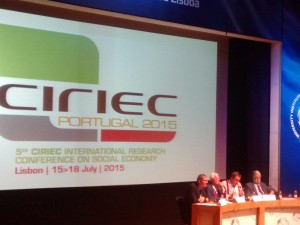Guest blog from Irena Knezevic, Assistant Professor, Communication, Carleton University
CIRIEC international research conference on social economy
July 2015, Lisbon, Portugal
International Center of Research and Information on the Public, Social and Cooperative Economy (CIRIEC) organizes a bi-annual research conference focusing on social economy, which by their definition includes cooperatives, mutual societies, foundations, and cultural and philanthropic organizations. This was its fifth conference and over 300 people from around the world were in attendance. Portugal was an appropriate setting for this gathering as the country boasts a vibrant social economy sector and in 2013 it adopted its General Law on Social Economy, following the example of Spain that similarly cemented social economy into its legislative framework in 2011.
This year’s theme was “Social economy in a Globalized World” and consequently many of the sessions focused on issues of globalization, financialization, governance, territories, and the social economy’s relationship to the state. In many ways it was a celebration of the contributions that the sector makes (and can potentially make) to social well-being in a world where economic inequalities are on the rise and the neoliberal economic model is failing.
A number of presentations relied on traditional economic theory to provide very abstract assessments and projections related to social economy. Others reported on very regionally specific trends. Nevertheless, several presentations offered some interesting intersections to our own work. Nathalie Verceles from the Philippines used her fieldwork with indigenous women’s cooperatives to illustrate how the social and informal sectors have been historically undervalued precisely because they typically employ those who are already socially marginalized. Alex Murdock from the United Kingdom described his work with social enterprises to develop measurements of social return on investment, something our community partners have already identified as a pressing need here in Canada. Jutta Gutberlet from the University of Victoria, BC, shared her research on participatory sustainable waste management in Brazil where informal recyclers’ networks formalized into cooperatives to develop enterprises focused on social inclusion, empowerment and collective action.
While generally an enthusiastic gathering, the conference was not without its critics. The purpose of the conference was to “[encourage] interdisciplinary dialogue, exchange and collaboration in order to enhance the contributions and applications of scientific inquiry for understanding and improving the life conditions and experiences of the less favoured people.”
 While the diversity of the participants was notable, the organizational leadership and keynote speakers were much more monolithic. The opening night and the second day’s plenary session included a total of twenty speakers. Only two of them were women (and one of them was not even on the original schedule but spoke in place of a participant who was unable to attend). The rhetoric of inclusion was thus not very well reflected in the voices that were featured. This, however, did allow for very lively coffee-break discussions among participants, suggesting that this imbalance was far from unnoticed.
While the diversity of the participants was notable, the organizational leadership and keynote speakers were much more monolithic. The opening night and the second day’s plenary session included a total of twenty speakers. Only two of them were women (and one of them was not even on the original schedule but spoke in place of a participant who was unable to attend). The rhetoric of inclusion was thus not very well reflected in the voices that were featured. This, however, did allow for very lively coffee-break discussions among participants, suggesting that this imbalance was far from unnoticed.
Despite this shortcoming, the general tone of the conference was that of certainty that social economy can bring about prosperity and equity much more effectively than the neoliberal model ever could. That potential, many of the participants suggested, is what will make social economy blossom in the coming years. You can find more information about CIRIEC here. Or visit the conference website where you can find the complete conference program.
